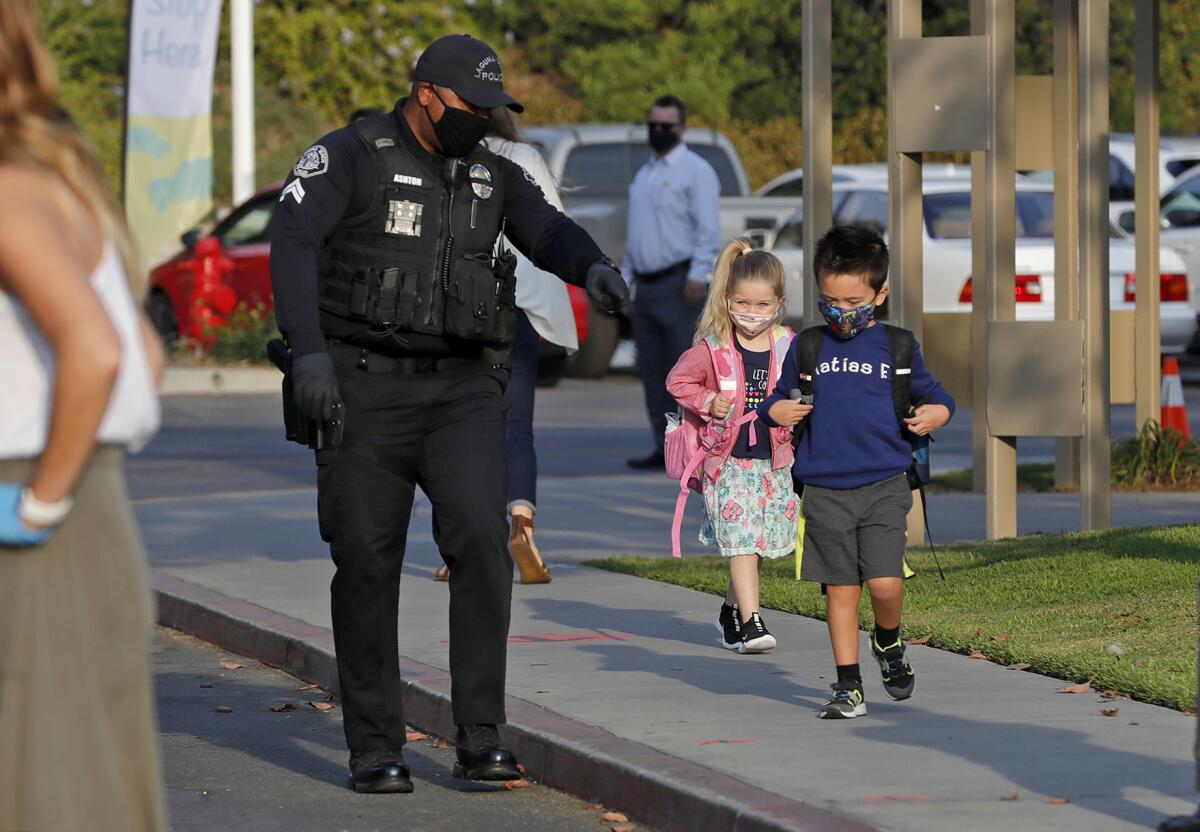Commentary: Orange County should do more to make its schools safe

- Share via
Wake up, parents. At present, many of our county schools are unsafe, and I make this statement after having spent over 20 years assisting in the coordination and teaching of school safety programs in the county. However, let me state at this point that the superintendent of the Newport/Mesa School District and staff have taken a proactive stance and are working with the community to improve security in the district.
But while most criminal justice administrators and school district administration laud their efforts to provide safe school environments, the facts show otherwise.
Our school resource officers countywide are spread thin, with usually just one full-time officer being assigned to high school campuses with only part-time service being provided to district junior highs.
Typically, no SROs are assigned to elementary schools, where most student/faculty assaults have taken place nationally.
And why is this?
With local superintendents of schools and their administrative staffs being paid hundreds of thousands of dollars annually, there seems to be just no money left to hire additional security, including purchasing sophisticated surveillance equipment for elementary and junior high kids. Its just “too expensive” say our well-paid bureaucrats at the local level.
I ask, then, where are our local and state legislators regarding this shameful situation?
Only certain private preschools and parochial schools seem to be relatively safe from armed intruders. Miraculously, they somehow found the money to protect themselves.
And, what about the training that SROs are required to complete before being assigned to a campus? One would think by now that this legislatively mandated training (Hughes SB1627) would be widespread, but it seems to vary from region to region throughout the state.
And some of the more rural jurisdictions in California do not even provide SROs or up-to-date training.
And what about the training curriculum and instructors?
It appears that there are only a couple of training programs for SROs in California. These are the POST (Commission on Police Standards and Training) class and the privately operated NASRO (National Assn. of School Resource Officers) training. While the POST training is very cost-effective, the NASRO training can cost hundreds of dollars per officer. So much for cost-effectiveness.
And the instructor qualifications in order to teach the SRO class? Study matter experts in several learning domains need to be used to make the training viable.
Some school police administrators will list the remarkable qualifications of their so-called POST and other “triple vetted staffers,” but why don’t most of these school police administrators and instructors have school police experience themselves? This is what the founding program chiefs insisted upon in 1999, but, unfortunately for the public, it is no longer a POST requirement. It’s worthy to note all NASRO instructors have school police experience.
Additionally, the POST course outline requires that its 40-hour classes include active-shooter drills. But please note that this key segment is now sometimes conducted through classroom simulator drills, not hands-on physical entry drills. This is inadequate. Do you suppose the Uvalde School Police Department trained with simulators instead of active shooter drills? Or did they drill at all?
I strongly urge parents everywhere to demand that city and education funds be made available for the immediate placement of elementary and junior high school SROs or other security personnel. Additionally, parents and the public should be allowed to review the qualifications of the SRO classroom instructors, no matter where they train, along with the experience of the administrative personnel connected with SRO training. You may be surprised and dismayed.
And don’t forget to ask these school police administrators how long they have been “triple vetting” their instructional staff members and note their reactions. Make them explain triple vetting and their instructors’ qualifications and which ones have had school police department experience. Believe me, this is important.
Kent Moore is a former Santa Ana College Criminal Justice Academies instructor/coordinator and former Orange County grand juror living in Corona del Mar.
All the latest on Orange County from Orange County.
Get our free TimesOC newsletter.
You may occasionally receive promotional content from the Daily Pilot.




